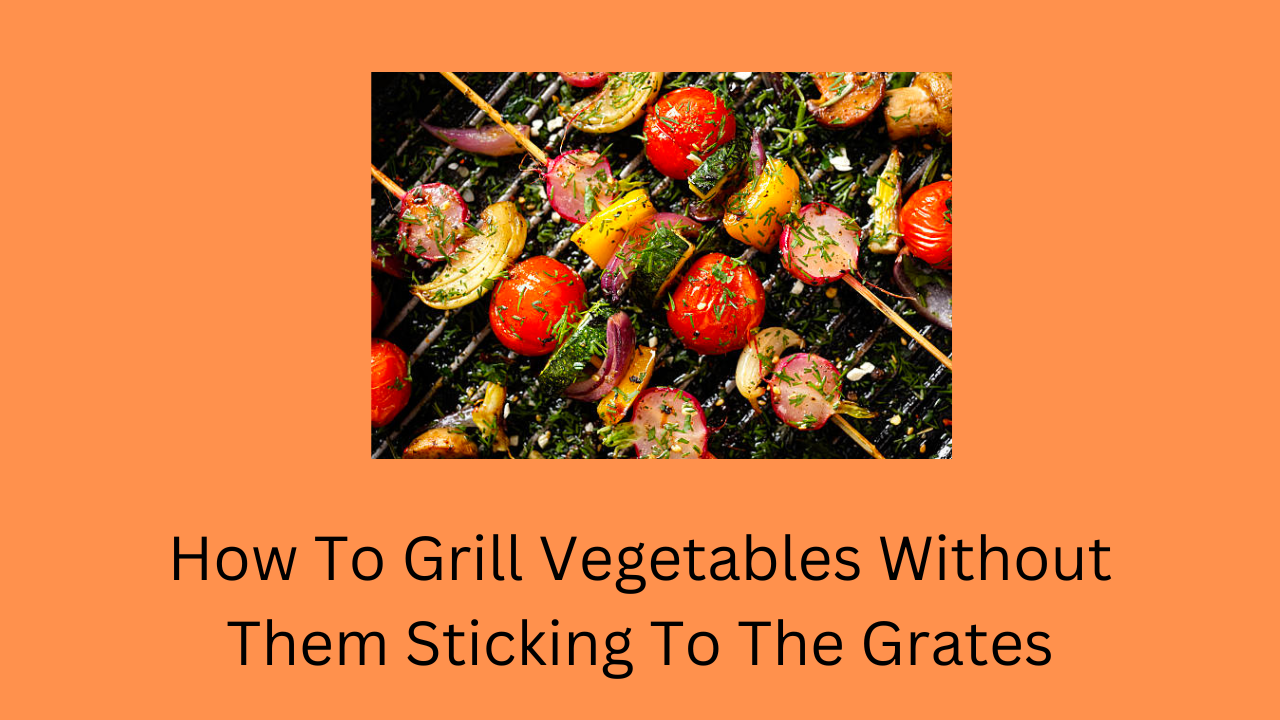There’s something magical about the sizzle and aroma of vegetables meeting a hot grill. Grilling vegetables imparts a smoky flavor and char that elevates their natural goodness to a whole new level. However, the challenge often lies in preventing those colorful veggies from sticking stubbornly to the grates, leaving you with a less-than-perfect culinary experience. If you’ve ever found yourself wrestling with stuck veggies and wondering how to achieve that flawless, non-stick grill perfection, you’re in the right place.
In this guide, we’ll unravel the secrets to grilling vegetables without the frustration of constant flipping or losing precious pieces to the flames below. Whether you’re a seasoned grill master or a backyard barbecue enthusiast, these tips and tricks will ensure that your next veggie grilling adventure is not only delicious but also hassle-free. So, fire up those grills, sharpen your tongs, and let’s delve into the art of grilling vegetables like a pro.
What Is The Best Oil For Grilling Vegetables?
There isn’t one single “best” oil for grilling vegetables, as it depends on factors like the type of vegetables you’re using, your desired flavor profile, and the smoke point of the oil. Here are some good options, each with its pros and cons:
High smoke point, neutral flavor
- Avocado oil:
This refined oil has a smoke point of around 520°F (270°C), making it great for high-heat grilling. It’s also naturally heart-healthy and has a buttery flavor that won’t overpower the taste of your vegetables.
- Grapeseed oil:
Another good choice with a high smoke point (around 420°F or 215°C) and a neutral flavor. It’s also affordable and readily available.
- Canola oil:
A common kitchen staple, canola oil has a neutral flavor and a smoke point of around 400°F (205°C). It’s a good budget-friendly option for grilling vegetables.
Medium smoke point, some flavor
- Peanut oil:
This oil has a nutty flavor that can be a nice complement to grilled vegetables. It has a smoke point of around 450°F (230°C), so it’s good for medium-high heat grilling.
- Olive oil:
Extra virgin olive oil has a low smoke point (around 325°F or 163°C), so it’s not the best choice for high-heat grilling. However, it can add a delicious flavor to grilled vegetables if used sparingly.
Other factors to consider
- Refined vs. unrefined:
Refined oils have a higher smoke point and a neutral flavor, while unrefined oils have a lower smoke point and a more pronounced flavor. Choose the type that best suits your needs.
- Organic vs. conventional:
Organic oils are produced without the use of pesticides and herbicides. If you’re concerned about chemicals in your food, choose organic oil.
Ultimately, the best oil for grilling vegetables is the one that you like the taste of and that suits your cooking style. Experiment with different oils to find your favorites!
Do You Need to Wash Vegetables Before Grilling?
Yes. However, Whether or not you need to wash vegetables before grilling depends on a few factors, but in most cases, it’s better to be safe than sorry and give them a rinse. Here’s why:
Reasons to wash vegetables before grilling
- Remove dirt and debris:
Even store-bought vegetables can have dirt, grit, and even small insects on them. Grilling won’t necessarily remove these things, so it’s best to rinse them off beforehand.
- Reduce the risk of foodborne illness:
Vegetables can harbor harmful bacteria like E. coli and Salmonella. While grilling will kill these bacteria, it’s still possible for them to spread to other surfaces if the vegetables aren’t washed first.
- Improve taste and texture:
Rinsing vegetables can help to remove any excess residue from pesticides or wax coatings, which can make them taste and feel gritty.
Things to consider
- Type of vegetable:
Some vegetables, such as leafy greens, require more thorough washing than others.
- How you’re storing them:
If you’re going to grill the vegetables right away, a quick rinse is usually sufficient. But if you’re going to store them for a while, it’s best to wash them more thoroughly and dry them completely to prevent spoilage.
How to Wash Vegetables for Grilling
- Rinse the vegetables under cold running water.
- Use a clean brush or your fingers to gently scrub the surface of the vegetables, especially if they’re dirty or have a rough texture.
- Pay extra attention to the stems and crevices where dirt can hide.
- Rinse the vegetables again to remove any loosened dirt or debris.
- Dry the vegetables completely with a clean paper towel or salad spinner. This is important to prevent them from sticking to the grill.
Here are some additional tips for washing vegetables:
* Avoid using soap or detergent on vegetables, as it can leave a residue.
* If you’re using a produce wash, be sure to follow the instructions on the label carefully.
* Don’t soak vegetables for too long, as this can remove nutrients.
How To Grill Vegetables Without Them Sticking To The Grates

Prep Like a Pro
- Clean those grates:
Scrape off any charred remnants from previous grilling adventures. A stiff wire brush is your friend, leaving behind a smooth canvas for your veggies.
- Sharpen the blade:
Blunt knives bruise vegetables, causing moisture to leak and increase sticking. A sharp knife makes clean cuts, minimizing the surface area exposed to the grates.
- Size matters:
Consistent size ensures even cooking and prevents smaller pieces from falling through the grates. Cut larger vegetables like bell peppers and squash into thick chunks or wedges, and trim asparagus to similar lengths. Smaller veggies like cherry tomatoes or mushrooms can be threaded onto skewers for easy flipping.
- Oil is your ally:
Don’t drown your vegetables, but a light coating of oil – high smoke point oils like canola or avocado work best – creates a barrier between the food and the heat. Brush or toss to ensure even distribution, avoiding oiling directly on the hot grates, which can lead to flare-ups.
- Marinades and rubs:
These flavor bombs not only add deliciousness but also act as a protective layer, minimizing sticking. Go for acidic marinades with olive oil, lemon juice, or vinegar, or experiment with dry rubs containing spices like smoked paprika or chili powder.
Heat and Timing
- Patience, grasshopper:
Preheating the grill is crucial! Aim for medium-high heat (around 375-400°F) for most vegetables. This sears the exterior quickly, preventing it from sticking to the grates. Throwing food on a lukewarm grill is a recipe for disaster.
- Don’t crowd the party:
Give your vegetables some breathing room. Overcrowding lowers the grill temperature and creates steam, causing sticking and soggy results. Keep the pieces in a single layer so they can sear properly.
- The great flip:
Resist the urge to constantly flip! Let the vegetables cook undisturbed for a few minutes to allow for charring and caramelization. Once they release easily from the grates, you can give them a gentle flip for even cooking.
Beyond the Basics
- Grill baskets:
These handy tools are perfect for small or delicate vegetables like cherry tomatoes or zucchini slices. They act as a protective cage, preventing them from falling through the grates and making flipping a breeze.
- Aluminum foil packets:
For a more indirect grilling method, create foil packets with vegetables, olive oil, herbs, and spices. The sealed packets prevent sticking and steam the veggies to tender perfection.
- Cedar planks:
Soak cedar planks in water for at least 30 minutes before grilling. Place your vegetables on the planks and watch them infuse with a subtle, smoky cedar flavor while grilling.
Bonus Tips:
- Keep a spray bottle handy:
A quick spritz of water on the grates just before placing the vegetables can help prevent sticking and add a touch of moisture for juicy results.
- Don’t be afraid to experiment:
From asparagus spears wrapped in prosciutto to grilled corn on the cob drizzled with chili lime cream, the possibilities are endless! Get creative with your vegetable combinations and seasonings to discover your signature grilled masterpieces.
With these tips and tricks in your arsenal, grilling vegetables will become a joyful, no-stick experience. So fire up the grill, unleash your inner grilling guru, and enjoy the symphony of flavors that await!
Remember: Patience, proper preparation, and a bit of heat-wielding finesse are the keys to grilling success. Embrace the char, master the flip, and watch your vegetables transform from humble garden dwellers to smoky, succulent stars of the BBQ. Happy grilling!

